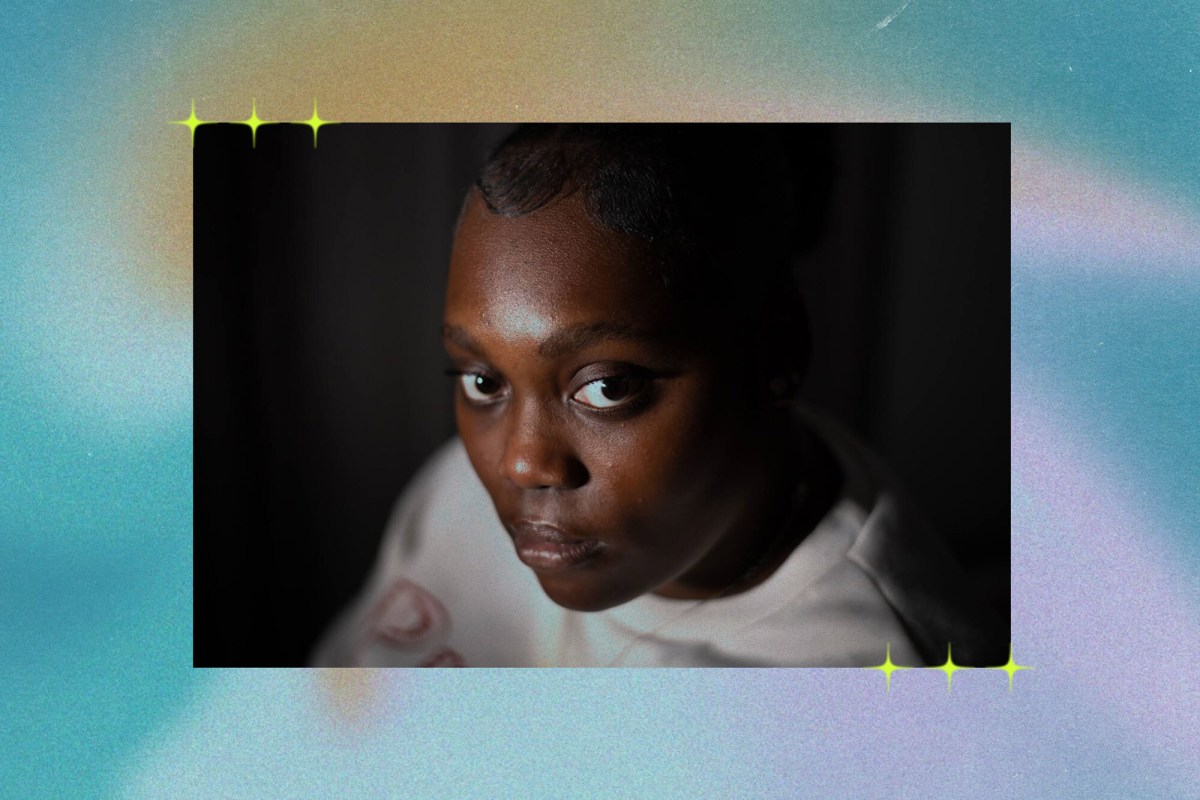Boys and girls, the birds and the bees, the double standards. In this conversation with Woodland Hills High School senior Tierra Bush, she discusses how she has viewed the differences in how boys and girls are groomed to behave and what that means within the larger context of sex, sexuality, and sexual safety. Bush shares about the challenges of coming of age as a woman and the advice she has for parents and teens when discussing sexual safety.

TRANSCRIPT
Jourdan: A note before we begin. This episode includes discussion of sexual assault, violence and coercion. Discretion is advised for when you listen, where you listen, and who you listen with.
Jourdan: I’m your host, Jourdan Hicks. This is From the Source Podcast. In this episode, high school senior Tierra Bush shares her ideas about how to improve the conversation teens are having with the adults in their lives about sex, sexuality and sexual safety.
Tierra: Hi, I’m Tierra Bush, 12th grader, so I’ll be graduating class 2023 — turn up. I go to Woodland Hills High School. I live in Wilkins Township/Eastmont. I’m always out and about.
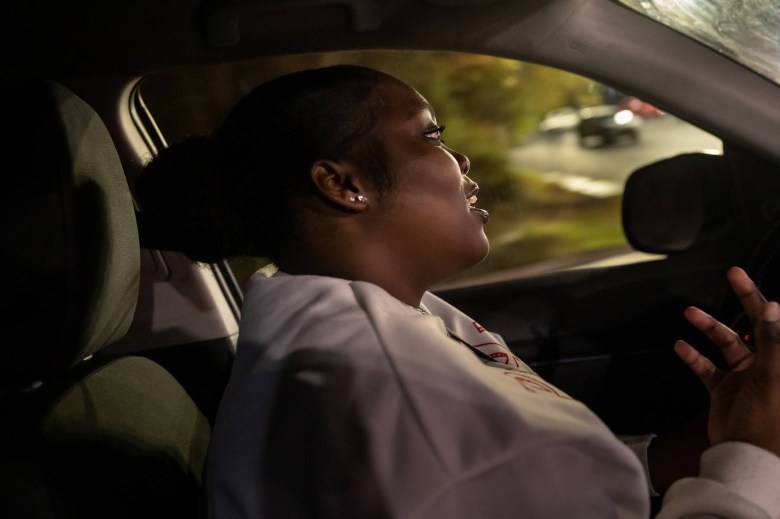
Jourdan: Tierra drives a silver Mitsubishi.
Tierra: Like today, I was just out all day doing, like, running errands and stuff.
Jourdan: She’s the friend who’s the chauffeur to the mall and the movies.
Tierra: Monroeville Mall is like a two-minute drive past my house. So yeah, it’s really sad.
Jourdan: Sometimes Tierra’s mom thinks it’s a little bit too easy for her to find reasons to go out.
Tierra: Sometimes I really have to stop myself because I would really just be sitting there getting in and out this car. It’s sickening.
Jourdan: When Tierra and I connected, she was knee-deep in preparations for her senior homecoming dance and making plans for how she’ll celebrate the final stretch to graduation.
Jourdan: You said you’re going to homecoming. You got your dress yet?
Tierra: Yes, I have my dress. It’s velvet. It’s black, sleek, very classic, elegant, you know, a sophisticated look.
Jourdan: Tierra’s date is going to match her swag. She’s going with her best friend, her little brother.
Tierra: Me and him, we’re Irish twins. We’re 11 months and 27 days apart. So I’m very excited, very amped up. I’m going with friends even though they have boos, but I’m going with like .. I’m going to have a good time. Like I said, I’m a very social person, I’m going to have a good time regardless. I would say my general personality is goofy, very loud, very like in-your-face type of person. I’m very opinionated. Like the the fighter in me has got I would say has become more recent because as a child, it was very like pushed. I was like, not pushed, but a lot of my family members kept me in a box and was just like you act a certain way so 8-year-old, 9.5-year-old Tierra was very outgoing, when she wanted to be. But I was also trying to find myself inside my family.
Jourdan: Tierra described her family as being passionate and traditional. As a child, there were expectations set early for her behavior because she’s a girl, the girl rules that she had to live by didn’t always fit her personality and often made her feel removed from her family, especially by the men in her family.
Tierra: Sex became a very big topic amongst our family between me and my brother and us because we’re so close in age so it just, the conversation shifted dramatically from just us being kids and having kid lives to just like relationships or romantic relationships, having kids and so on and so forth. It’s also for my family around dad’s side, it’s just a bunch of boys, like they all have boys. My dad is the only man to have girls. He has girls, which is like a big thing. So when they raise the boys, it’s like toughness, sports. Like it’s this idea of, like, toughness you have to provide for your family. For the females, it was like cater to the men, cater to the boys and not speak. The idea in my father and my uncle’s head are that women are supposed to be this way and not that way. So when I’m the opposite of that, I’m like, I’m not doing A, B, C or D, it’s a problem.
Jourdan: The advice that they got on love and dating was different, too.
Tierra: So it was like, Oh, you can’t date nobody, you can’t like nobody, you can’t look at nobody. OK, but then they would parade to my brother and say, you need to go out. You need to go out looking for females. A,B,C and ,D and I was just like, why does he get to do it and I can’t? It’s just so biased and hypocritical. How do you tell one child it and another child that, especially close in age, especially when we go to the same school.
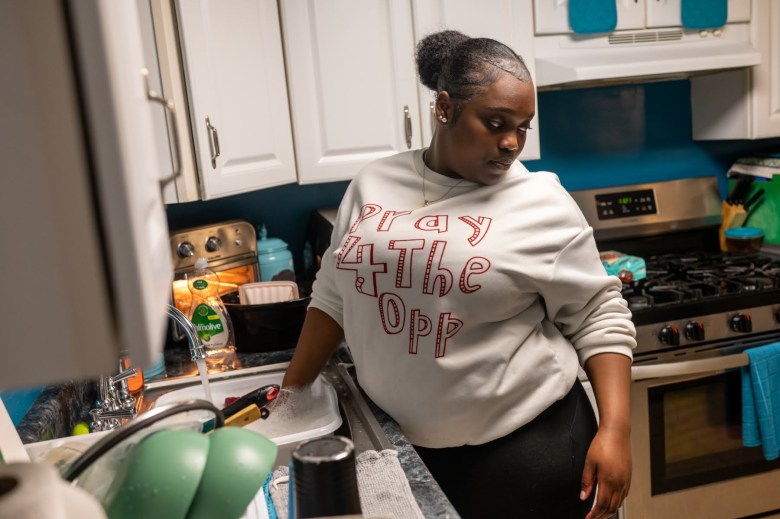
Jourdan: Tierra says the advice to stay away from guys was meant to protect her. But the lack of a nuanced conversation actually put her more at risk.
Tierra: Heaving conversations about sexual health, sexual responsibility and talking about what what you like, what you don’t like, what’s not right, what is right. A lot of times women walk in to situations where they are so uneducated on a topic. And I feel like that conversation needs to be had instead of just saying, oh, you shouldn’t be talking because you’re a girl, oh, you shouldn’t be talking about it because you’re too young. No, we’re thinking about it. No, it’s happening. It’s common. People talk about it all the time. Let’s talk about it.
Jourdan: Tierra says when adults aren’t upfront with teens about conversations of sex and sexuality, they’re more likely to end up in situations where they don’t know what’s going on or where their own boundaries are.
Tierra: Instead of saying no, I enjoyed myself, I had a good time or no, I didn’t like this, but I did like that. Like just having those conversations about growing up and just being open, and I feel like besides like just talking about sex and sexual health and sexual responsibility. Just constantly being open with teenagers, especially women like young girls about the thing, which is what’s going on. Like what was different, what’s new and just like development because every day something is happening in someone’s life.
Jourdan: Tierra helps facilitate these kinds of tough conversations between teens on the Black Eyed Peas in a Pod podcast, which she co-hosts powered by the Wyman’s Teen Outreach Program known as TOP. The series is dedicated to discussing what high school teenagers are going through and are feeling on various topics like stress, body image, and substance abuse.
Tierra [on Black Eyed Peas in a Pod Podcast]: Some people will try to say, Oh no, like my kids didn’t get that from me. Oh, I don’t know, not in this house or whatever the case may be. But end of the day them are the same parents, that is not like, okay, Johnny, let’s talk about it.
[Black Eyed Peas in a Pod Podcast]: Right, sit down and have a conversation.
[Black Eyed Peas in a Pod Podcast]: Let’s talk about it. What’s going on?
[Black Eyed Peas in a Pod Podcast]: Yeah.
Tierra [on Black Eyed Peas in a Pod Podcast]: Why are you so angry? Why are you smoking weed? Where did you get this from? What makes you want to do that? You know, it’s always you’re in trouble, which, of course there should be consequences, but there’s always a deeper reason to that.
Jourdan: Tierra says one episode discussing sexual assault was especially meaningful to her.
Tierra: It really opened my eyes to a lot of things that I allowed to slide due to the fact that I didn’t know a lot about sex and I didn’t know a lot about, like, sexual coercion and just like having that conversation’s what got me there. If I didn’t have it, I would never knew that him saying that he’s going to be mad because I didn’t want to send him a picture or him being mad because I didn’t want to do A, B, C and D was sexual coercion.
Jourdan: Starting when she was about 8 years old, an older male family friend would urge Tierra to sit on his lap or press her for physical contact. Tierra didn’t go into detail about what was done to her, but she did allude to feeling unsafe. Unsafe with some of the physical contact that was being normalized with this person. Everybody else thought it was fine, but she didn’t. And it was being done in plain sight.
Tierra: Like he never did anything, like publicly or like from the pure eye, no one would see anything wrong with it, but I knew what was wrong because I know I felt uncomfortable.
Jourdan: Tierra would make excuses saying that she had to go to the bathroom. She says she told her parents she was uncomfortable and got very different reactions.
Tierra: My dad never caught, like never made it an issue, like leave my daughter alone. My dad was just like there’s nothing wrong with that. I said, ‘Oh, oh OK.’. When my mom needs to be, she’s like my biggest fighter, my tap into the ring, always.
Jourdan: Thank you for sharing. I think that this will resonate with a lot of people, parents, and children, because, you know, parents, they mean well and maybe feel like sometimes that they can do all they need to do to protect us and keep us from situations that will harm us. Family dynamics are tricky and nobody wants to rock the boat. And like you said, that’s enough, like your discomfort is enough. There shouldn’t be like a level-one offense and a level-five offense. Like level one is level five.
Tierra: For my mental health, for my space, for my sanity, he’s not even a relative or blood of mine. So I don’t need to speak to him, and my family doesn’t understand that because their lack of education on sexual assault is so very one-sided, very like the boogeyman, this man is going to snatch you in an alley.
Jourdan: It’s going to be someone that you don’t know, it’s going to be someone we can obviously point out they’re going to have signs that they’re aggressive or that they’re offenders.
Tierra: When it’s the complete opposite, like obvious, it’s always someone that you know, someone that you would never catch. So it got to the point where my family was having these family meetings and they were talking about it without me being there. I’m just like, ‘If y’all don’t believe me, don’t believe.’ Like, at this point what can I do? I can’t do nothing. If no one would defend me, I’m going to defend me. Sometimes it’s hard for some women to do those things and advocate for those things. And I feel like, that’s why I’m here. That’s why, you know, cause I don’t care to be the bad guy. I really don’t. Not everyone is going to like me and I don’t care. I’m always trying to better myself. trying to become a good human being and do right.
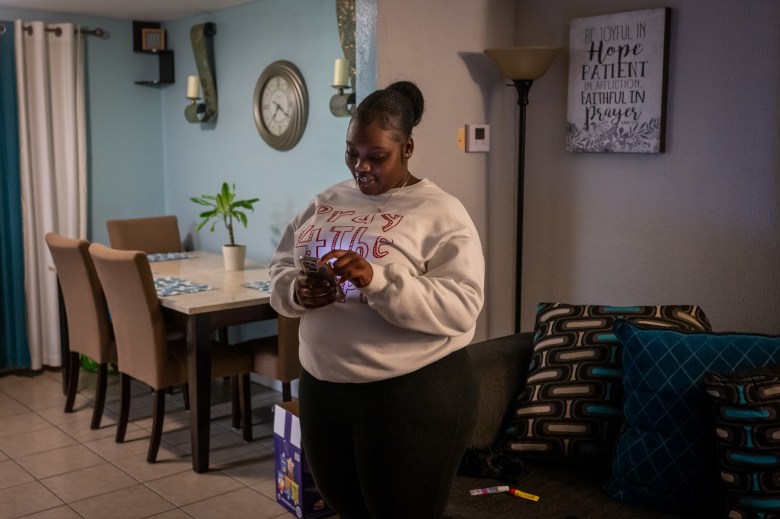
Jourdan: In the future, Tierra wants to educate girls and women about their bodies, identities and autonomy of choice.
Tierra: Because I always wanted to be from, not always, but since freshman year, I always wanted to become an obstetrician-gynecologist (OB-GYN). I’m getting older and having these conversations about sexual assault and sexual responsibility, it’s opened my eyes to like how uneducated I was, like super uneducated I was about my own body. Like hearing it, like when I relive it, I’m just like, oh my goodness, like, wow, like Tierra, we had no clue. And so it really helped pushing the idea of me advocating and educating young women like me, and young girls, and like not just only just like being in the delivery room or just being in an office but being in clinics and saying this is not OK, and this is why it’s not OK and this is why you should speak up.
Tierra: Dealing with the betrayal of my family, it brought me to wanting to advocate for others. So it just made me vocalize these horrific experiences. I’m one of a million situations that someone’s father or stepfathers so and so forth has tried to enable or force this idea that it wasn’t what it was and that you might have took it the wrong way, or you may have just misunderstood. Why would I misunderstand something as simple as a hug, simple as a gesture? No, it’s a very frustrating topic for me because just like it all could be so simple, like talk, discuss, address. Let’s not hide anything behind closed doors. Let’s really talk about it so women don’t have to grow up with this burden.
Jourdan: Tierra made it a point of highlighting how the lack of intentional conversations about sexual assault, sexual coercion isn’t just harmful to girls. It leaves boys and young men just as unguarded as she was.
Tierra: I talk to the guys and like a friend happened to bring up like how a situation happened where one of his teammates he knew was, like, pinned down … and he was vividly uncomfortable. Like everyone knew he was uncomfortable. It’s like that little bit, snippet shows just how not talked about of sexual assault of men is not talked about or even like, losing your virginity at a young age to like 20-year-old women. Was this consent? Why was this consensual? Was this both? And did everyone agree on this? And he didn’t even take it as that. Like she violated you and took advantage of you.
Jourdan: Tierra says she looks at what she’s had to endure in the last few years with pride and empathy.
Tierra: I feel like throughout the frustration and the troubles and the sadness it can be very much at times, it also is very happy. Like I’m very excited that I can walk into my college years understanding a lot about myself and feel like it’s just, it’s a very happy and joyful sight to me, to go like walk out of high school into my freshman year of college and while I don’t know a lot of myself, I feel like I’ll be cool, like the person I am right now, she’s great. Like, I can really, I’m very happy to say that because it’s just like it took me a long time to really, like, sit down and, like, be like you. You do a lot and you’re very, you’re a great person and don’t don’t forget that.
Jourdan: One in 9 girls and one in 53 boys under the age of 18 will experience sexual abuse or assault at the hands of an adult; 82% of all survivors under the ages of 18 are girls.
The effects of sexual assault or abuse can be long-lasting and affect mental health. Think about this: Those minors who experience sexual abuse are about four times more likely to develop symptoms of drug abuse, four times more likely to experience PTSD as adults, and three times more likely to experience a major depressive episode as adults.
If you or someone you know has been sexually assaulted or abused, you can anonymously make a report with RAINN (the Rape, Abuse and Incest National Network) through its hotline at 1-800-656-4673. The hotline can help you to locate health facilities trained to care for sexual assault survivors and provide services like forensic exams or finding local resources and information to assist you in healing and recovery.
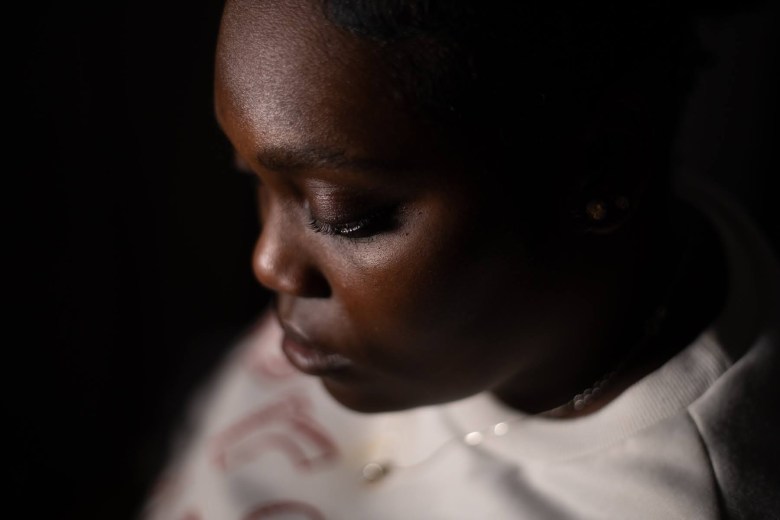
Jourdan: Season four of From the Source Podcast is produced, reported, and hosted by me, Jourdan Hicks, and edited by Halle Stockton. Liz Reid of Jeweltone Productions produced and mixed this episode. We continue to interview young people for the podcast as we speak. If you’re curious to learn how you can share your story with us, or nominate a young person ages 13 to 18 to appear on an episode From The Source, you can get in touch with me by sending an email to Jourdan@publicsource.org.
PublicSource is an independent nonprofit newsroom in Pittsburgh. You can find all of our reporting and storytelling at PublicSource.org. I’m Jourdan Hicks. Stay safe and be well.

